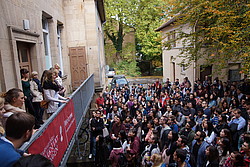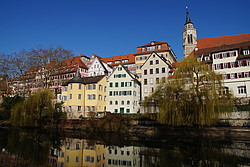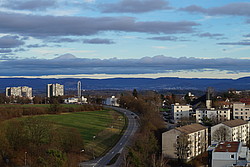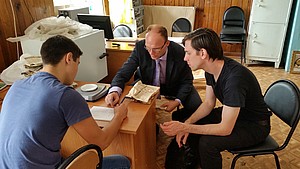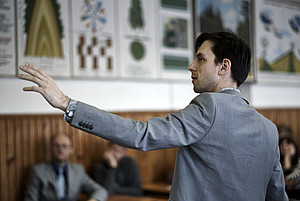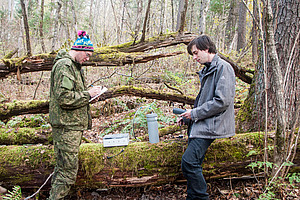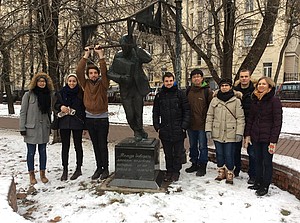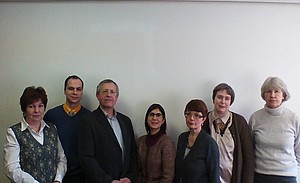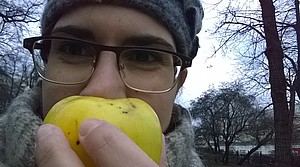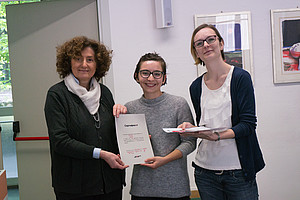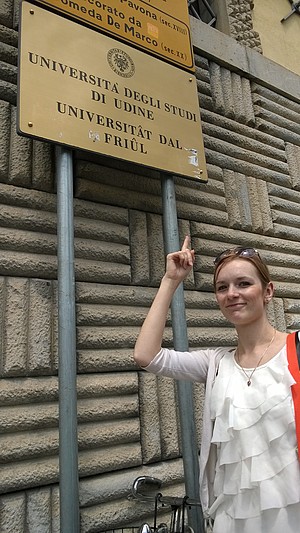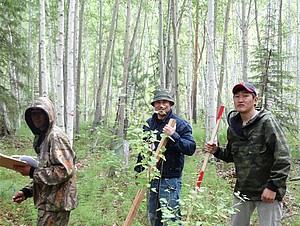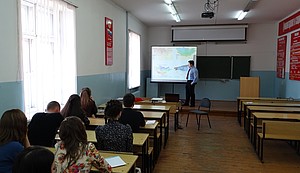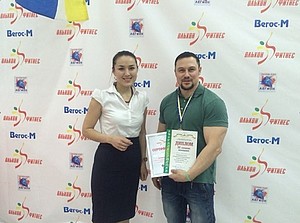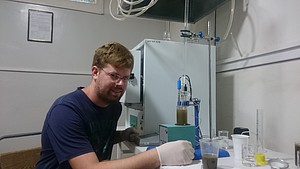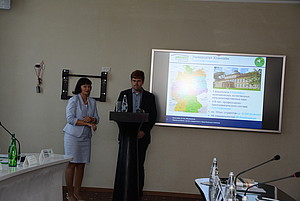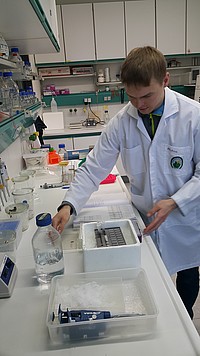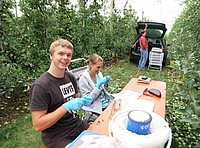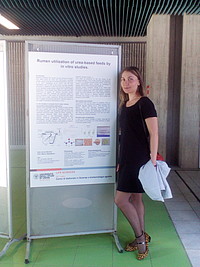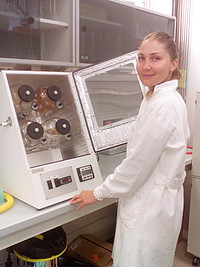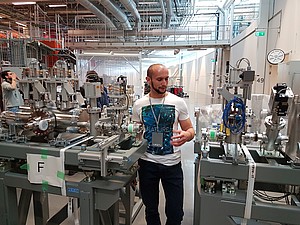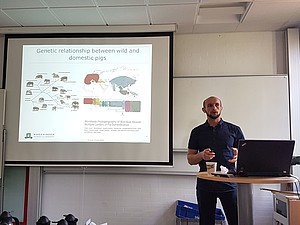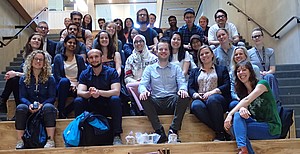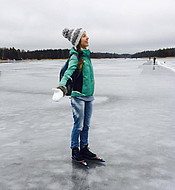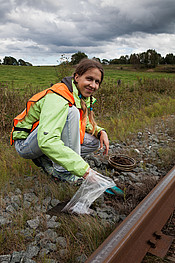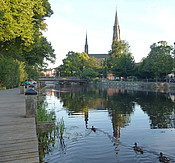Doctorates
Doctorate, 6 months - WS 2015/2016 at the University of Tübingen
For me the opportunity to study in Europe was always a dream. Therefore, I could not miss the chance of applying for the IAMONET-RU project. In 2014, I applied for a grant within Target group 2. The acceptance process was quite simple in my opinion, but took a long time. My priority was Eberhard Karls Tübingen Universität. I was very happy and excited when my application was approved. After it I started learning the German language. I am sure that everyone should know the language of the country he will live in, even if it is just half a year.
My IAMONET-RU mobility at Eberhard Karls Universität Tübingen started in October 2015 and lasted 6 months. For me this period was too short, because half a year was not quite enough in conditions I had. I must say that it is important that I expanded my experience and I had a chance to get to know a lot of interesting people and become involved in the European system of education. I have learned some new things I had no chance to learn in Russia. It is a well-known fact that there are some cultural differences between nations, even in some universal things like science. In Germany, scientists I have met were focused on one particular subject or process they deal with and so they had great results. In my hometown, things are much more complicated, because academic staffs have many responsibilities apart from their research, and it takes quite much time.
So, during my IAMONET-grant I could concentrate on my own research and this is a huge contribution to my PhD work. I tried to do my best and learned many new things from my European colleagues. I presented my research to my colleagues and got some good advice. I was enrolled in the courses of Machine learning and Advanced Neural Networks Practicum. Both courses were a little bit complicated, because they were based on previous basic courses, which I could not attend. The course of machine learning was amazing and very interesting. Unfortunately, it was difficult to understand all things at once because of differences in teaching between countries. I also worked hard on my research which is devoted to speech recognition. During my research, I was trying to apply machine learning and neural networks approach for constructing new decision function for my feature space.
The communication between me and my colleagues was warm, fruitful and interesting. I was glad I could know those people and should say them many thanks. My stay in Tübingen was full of different events and wonderful memories that I will never forget. I saw so many fascinating things and people, which were really excited by what they did. It was a really good experience and a great achievement for me. I would like to thank the IAMONET-RU mobility program for giving me the chance to expand my knowledge and broaden my mind. There are no doubts for me that I can use the knowledge I have got in Germany. I am sure that this experience will support me in my academic and professional career.
Doctorate, 6 months - WS 2016-2017 at Primorskaya State Academy of Agriculture
Topic of the research conducted: "Annual and seasonal variation in carbon flows in a temperate rain forest in the Russian Far East".
The main goal of my stay in Ussuriysk was to determine the amount of carbon respiration from forest soils, coarse woody debris as well as litter (and the amount of litterfall) for selected sites in the Russian Far East. In autumn, I participated in field trips where I had a possibility to get acquainted with field methods and instrumentation and supported the process of data acquisition. After the end of the field period I worked on my thesis and wrote one publication introducing the sphere of my (BOKU) PhD research to a Russian readership, which helped to exchange ideas about our common research project. In winter, I mainly worked on data analysis with the aim to characterise the data collected by my colleague in the last three years and to publish central results.
Integration at the faculty: There was intensive cooperation with my supervisor/colleague on a weekly basis at the beginning of my stay and at the end on a nearly daily basis which helped to discuss research problems and progress comprehensively. I was frequently invited to the scientific circle "forest ecologist" where I listened to current research progress and results from various faculty members and had two presentations myself.
Differences in scientific work: The University was strongly focused on forestry in its classic sense, while at the home university research connected with the forest-based sector is subdivided into four departments and more specialised. In my dissertation, I focused on forest economics and wood product markets but we found a common language through our mutual interest to analyse carbon stocks and flows in the forest-based sector. While my home institute focuses on modelling the focus at my host university was on field work providing an excellent starting point for cooperation with those two foci being complementary to one another. Results: I made three short lectures/presentations and participated in a conference at the beginning of our stay. I published one peer-reviewed article. Additionally, we submitted three SCI articles. During my stay, I made significant progress on writing my dissertation.
Personal aspects: The exchange semester helped me to get in touch with colleagues at my host university and researchers from other universities in Russia. I am confident that our publications will help my supervisor and me to advance our careers and collaborate in future projects. My knowledge of the Russian language improved considerably. Given the possibility I would apply again for IAMONET and recommend it to other (PhD) students. I believe that I could contribute to my supervisor's aim to increase the understanding of carbon dynamics for forests in Primorye.
Doctorate, 6 months - WS 2015-2016 at Lomonosov Moscow State University
The chance to study for a semester at "Lomonosov" Moscow State University was very useful for my research plan as well as for my personal and cultural development. My research deals with the analysis of Elizaveta de Vitte's literary and political works. Elizaveta de Vitte was a Russian writer and pedagogue, who actively took part in the social and political history of the Tsarist Empire between the end of the 19th century and the First World War. In the first decade of the 20th century Elizaveta de Vitte travelled a lot through Southern and Central-Eastern Europe in order to study regional Slavonic ethnic groups and to tell about them through her essays and travel notes. According to my point of view, her literature shows one of the main contradictions that characterized the Russian Empire in the last decades of its existence: on one hand, rigid conservatism and on the other hand, the need to establish a colonial empire in Europe developing the idea of a Pan-Slavic union in the name of a common past and culture.
At the Faculty of History of "Lomonosov" MSU I attended two specific seminaries organized by the Chair of Russian History, XIX-beginning of XX century: 1) History of Female Education in Russia. XIX-beginning of XX century, 2) Russian monarchism from the end of XIX century to the middle of XX century: ideology, personalities and institutions. Every single step of my research work was planned in accordance with my tutor, prof. N.I. Tsimbaev, who gave me methodological guidelines. We regularly met on Thursdays to verify my research development. Moreover, I had a chance to receive useful advice from the chair of History of the Church and from the Faculty of Philology, chair of History of Russian Literature of the XX century, thanks to prof. M.V. Michajlova, who gave me important bibliographical suggestions to rebuild the female literary panorama in order to contextualize de Vitte.
Apart from that, I regularly attended classes on Russian language and culture for foreigners in order to improve conversation, grammar and writing skills. Besides that, I carried on with a previously established collaboration with the Russian Academy of Sciences (Institute of Slavic Studies), specifically with prof. T.I. Čepelevskaja, who deals with the History of Southern and Western Slavic peoples and wrote an article about Elizaveta de Vitte, so we shared our discoveries. She invited me to report on my research to her colleagues of the aforementioned department and to answer their questions. Moreover, I regularly studied at the Russian State Library, State Public Historical Library and at the Russian State Archive of Literature and Art where, apart from my research, it was possible to attend interesting lessons to learn about the usage of catalogues, funds and online resources. I also took part in a literary competition "In the world of Russian Literature", to which I sent an article and shot a video where I read a passage from the novel at Dostoevskij's museum. Furthermore I gave a lecture to a group of students about the use of historical sources, documents and E.I. de Vitte's literature.
Apart from the academic experience, I attended the most memorable "lessons" walking by Moscow, visiting interesting museums, Cultural Centres, expositions and watching plays in different theatres. For a young researcher this is the way to overcome "mental barriers" and understand new aspects of Russian culture and identity. To conclude, the chance given by the IAMONET-RU project is very important, as it has allowed me to enrich my research, to have concrete results and to improve research methodology thanks to the exchange with important specialists. As concrete result of this period of studying at "Lomonosov" MSU, in order to continue the collaboration with the Faculty of History, prof. Tsimbaev will be "external consultant" for my Doctoral dissertation, as well as prof. T.I. Čepelevskaja from the Russian Academy of Sciences.
Doctorate, 36 months - starting SS 2014 at the University of Udine
Unfortunately, the benefit report is limited to one page. One page is definitely not enough to describe all benefits I received from the program. My research is related to language. I am interested in psycho- and neurolinguistics. For years, I have been studying first and second language acquisition in children and adults. I arrived to the University of Udine in order to continue my research in this area. Thanks to my colleagues and professors from the Department of Languages and Literatures, Communication, Education and Society, I easily got integrated and started working on my own project.
Overall, during these 3 years of my stay at Uniud I was following several language courses and in the end passed Italian B2 exam, English C1 and English for academic purposes courses, and, finally, German A2 level exam. I participated in a number of summer schools, conferences and workshops on new experimental methods which can be used in language studies.
During the first year at Uniud I had an opportunity to follow the lectures about linguistics and related areas from the best professors at the University and those invited speakers talking about project design and on how to work in an academic team. By the end of my 3rd year, I have finished conducting linguistic experiments for my own project. I worked with mono- and bilingual children piloting the Russian version of the Battery of tests that aims to assess their language development. I learned how to write reviews on the articles from the leading academic journals (e.g. I was an author of a review for the paper published in the International Journal of Bilingual Education and Bilingualism in 2017) and how to write and publish scientific articles and abstracts presenting the results of my own work in English.
I boosted my presentation skills and public speaking skills talking on 23rd Summer school on cognitive science (July, 2016) and Experimental linguistics conference (June, 2017). Moreover, participation in a number of international scientific events helped me to build my own academic network. Now I am happy to cooperate with colleagues from Omsk, Kazan, Moscow, St. Petersburg, Kursk (Russia), Copenhagen (Denmark), Rome, Milan, Venice (Italy), Potsdam (Germany) and many others.
There is one thing I particularly loved about my PhD course at the University of Udine - a degree of freedom students have there in terms of time management and areas in which they would like to deepen their knowledge. I had enough time to fill the gaps in some theoretical topics I had before my mobility period and also to build new skills in analysis of linguistic data. Students having strong motivation might want to take external online courses and be sure that their supervisors will support them. As for me, I followed several online courses and believe it contributed a lot to my scientific profile.
One more opportunity I was offered from the Host University is teaching activities. For 2 years, I was teaching Russian language to Master's students and saw second language acquisition process in real time. I became a part of international students' organizations (AEGEE; ALL) and participated in a number of cultural events organized by other Erasmus students. Moreover, I organized my own cultural events ("Global dictation") and was a coordinator and a head of linguistic commission 2 years in a row.
The end of the mobility period does not mean for me the end of my academic activities. I recently got my abstracts accepted for 2 conferences at the end of 2017 and received a grant for participation at International Summer school in Moscow. Also, I prepare a new article and hope to get it published soon. I can hardly remember any negative aspects of the stay and I would definitely apply again for IAMONET-RU.
Doctorate, 6 months - WS 2014-2015 at Buryat State Academy of Agriculture
The primary focus of my research project was examining the impact of climate factors, natural disturbance dynamics and silviculture on forests in the mountain forest steppe and taiga in northern Mongolia. My research partners at the Mongolian University of Life Sciences suggested visiting also the Buryat State Academy of Agriculture (BSAA) in Ulan-Ude and I applied for a research stay and was accepted. During my 6 month stay, I also visited other Russian universities. My stay in Russia began with several days in St. Petersburg, where I was fortunate to attend several academic events held at the St. Petersburg State Forest Technical University, which included exams on Russian forest policy with Prof. W.N. Petrov. Another valuable experience in St. Petersburg was learning the special procedures of the traditional Russian Banya. A few days after the Russian Christmas, I continued on to my main destination which was Ulan-Ude, the capital city of the Republic of Buryatia.
After very motivating discussions with my supervisor, Dr. A.A. Altaev, I began writing articles for publication (some I had started preparing before). This marked the beginning of an extraordinarily productive period: from January to June 2015, I published three full-text contributions for presentation at conferences in Russia and Mongolia, an abstract and a poster for a conference in Nepal and co-authored an abstract on testing a new method for integrating remote sensing and ground-based observations of forests. In February and March I was reviewing a master's thesis I had co-supervised at the Technische Universität Dresden. This student later became a co-author of a scientific publication on the climate-growth relation of birch trees as a part of my PhD project (published in 2017). Together with Mongolian and Russian co-authors, I then wrote another scientific article on spatial structure and growth of birch and larch forests, which was published in autumn 2015. In April 2015, I had an opportunity to do a short research stay in Primorye, the southernmost province in the Russian Far East. Together with Dr. A. V. Ivanov from the Primorye State Academy of Agriculture in Ussuriysk, I co-authored a non-scientific article in German on biodiversity of the far eastern broadleaf forests and successful nature conservation activities being conducted in the region. This article was reviewed by WWF Germany and was accepted for publication in summer 2015. I also co-authored an additional non-scientific article on Buryatia planned by my Russian supervisor, which after briefly being postponed, was eventually published in Austria (2016).
Outside of the academic setting, I won third place in the Buryat Bench Press Championships (93 kg weight class), despite limited training preparation due to the extensive workload of writing articles and preparing for conferences. During my previous employment as a development worker in Mongolia, I had participated in similar competitions. Sport has always given me the opportunity to make important cultural connections in my life outside of work. I stayed a bit longer than expected. In the warmer season, from May to July, we launched a joint German-Russian field work initiative at the research station Orongoi. Together with Russian teachers and students, we established two research plots in accordance with standards established in an earlier Mongolian FAO-Project.
Due to the very good and free working conditions, the excellent support from the BSAA and the perfect logistic connection of Ulan-Ude in the frame of my research with our Mongolian partners I returned in 2016 and 2017 for several months to Ulan-Ude (Russia) and to Darkhan and Ulaanbaatar (Mongolia) and continued working on my research. I submitted my PhD-thesis in June 2017 at the University of Göttingen.
I highly recommend both the IAMONET-RU program and the Buryat State Academy of Agriculture in Ulan-Ude. It was a good and rewarding experience in every respect.
Doctorate, 6 months - SS 2016 at Belgorod State Agricultural University
During my Erasmus Mundus IAMONET.RU mobility, I worked at the project "Development of a batch test and determination of biogas yields from different substrates in Russia" at Belgorod State Agricultural University V. Gorin (Russia).
During this time period, a simple batch test with glass bottles and a system to measure the gas quantities were developed. After the construction of the test facility, the functionality was tested with a standard substrate, poultry as well as swine manure. In an additional experiment, the influence of nitrogen concentration in the substrate on the process stability was investigated. During this experiment, simple methods of measurement of the gas quality and the FOS-TAC value (Ratio of volatile fatty acids to carbonate buffer capacity) were established for process stability evaluation.
Moreover, two papers were published in the Russian Journal "Innovations in Agro-industrial complex" - Problems and prospects (Utilization of livestock and poultry waste in production of biogas in the conditions of Belgorod region of Russia) (Инновации в АПК: проблемы и перспективы (Утилизация отходов животноводства и птицеводства с получением биогаза в условиях белгородской области Pоссии) as well as in the scopus listed journal Landtechnik (Anaerobic digestion of sugar beet pulp in Russia). At the conference "Problems and prospects of innovative development of agricultural technologies" (Проблемы и перспективы инновационного развития агротехнологий) in Belgorod as well as at the Commission Meeting for International Cooperation of Rectors' Council of Belgorod region (Заседание комиссии по международному сотрудничеству совета ректоров вузов белгородской области) I have done a presentation about the topic "German-Russian collaboration in biogas science". During the international summer school "Agrisummerru", I held a lecture about the topic "Development of biogas production in Belgorod region" together with Dr. Irina Miroshnichenko.
My stay in Belgorod was a great opportunity to share my knowledge in the field of biogas with scientists in Russia, to improve my experience in the implementation of experiments as well as to get new contacts with foreign scientists. Furthermore, I gathered important international working experience for my further work life.
Doctorate, 18 months - starting SS 2015 at the University of Hohenheim
In April 2015 I arrived to Germany having a very strong motivation to study physiological reasons of biennial (alternate) bearing in apple as a PhD student. Biennial bearing brings a lot of difficulties for commercial apple orchard management. This phenomenon can be described as a "yield break" due to absence of flowering every second year and can be observed in the majority of apple cultivars. A big team of scientists from the Institute of Crop Sciences (University of Hohenheim) under the supervision of Prof. Dr. J. Wünsche is investigating the reasons of biennial apple behavior. They warmly accepted me as a member of the scientific crew. As every foreigner, I had to adjust to the new conditions, but it wasn't difficult because all my colleagues speak English fluently and have been helping me during my stay.
It is well known that cultural and mental differences in people from different counties do exist, even regarding such a universal things like science. People here more focused on one particular subject or process they deal with. In my home university scientists are dispersed in many responsibilities that sometimes keep them away from doing important things. The contribution of IAMONET-grant into my scientific career is incredibly huge.
At the University of Hohenheim I got valuable experience working on the level of DNA, RNA and plant hormones that opened new doors on my scientific path. Moreover, German scientists are interested in creation of common scientific platform where both sides, Russian and German, could launch projects, exchange students, publications and experimental results. I'm sure that these connections would allow me to continue researching on the common basis and to be involved into this network.
During the mobility I've learned how to work in the multinational scientific team, how to present results at the international scientific conferences, discovered many interesting things about German culture and of course improved my language skills. In addition I would also like to mention that I participated in scientific conferences in Germany, Check Republic and Italy. I consider this as a great personal benefit. I'm happy to admit that I do not see any negative aspects of the mobility and would apply for IAMONET again.
Doctorate, 36 months - starting SS 2014 at the University of Udine
Study of the rumen nitrogen metabolism using in vitro fermentation systems. I was fortunate to study and work in the warm and friendly atmosphere during my mobility. Thanks to my colleagues I gained a wide range of theoretical and practical laboratory skills. As a result of the scientific activity, in February 2017, together with my research group we published in Livestock Science Journal, another scientific article is under revision in Animal Feed Science and Technology Journal, and currently, we are working on the results of the third experiment of my thesis. Lectures and seminars proposed by the Host University were very useful, including language courses, which improved significantly my English and Italian language proficiency.
I participated in several national events in Italy, such as RuminOmics Regional Workshop in Lodi, October 2015, Dairy Exhibition in Cremona, October 2016 and, the National Congress of the Animal Science and Production Association (ASPA) in Perugia, June 2017. Later, the results of the work held jointly with the laboratory in Aberystwyth University, UK were presented. This collaboration was established during my two-week scientific exchange visit to Aberystwyth in February 2016.
One of the many positive aspects studying at the University of Udine, which I consider worth to mention, is that the research itself, publications and some conferences' cost are covered by different Research Funds. Another important aspect is the variety of language courses provided, giving as a space for personal development as well immense career opportunities. As for scientific work, I would like to stress a strong and professional support of my scientific supervisor Prof. Mauro Spanghero.
I am very grateful to IAMONET-RU project first, for the great opportunity to obtain my PhD in Europe, which certainly will bring my career to another level. Second, I have acquired substantial knowledge in Animal Nutrition area, which is closely related to my speciality (Food Technologist). Last, but not least, owing to the IAMONET-RU Project, I and my family acquired a life-experience while living in this warm and flourishing country, enjoyed an ancient culture, learnt Italian and met wonderful people. Also, I want to express my gratitude to Prof. Yuri Nikolaevich Litvinov and the staff of the international department in Russia, to Prof. Rosanna Giaquinta and to all the coordinators of the Project for their professional help and support.
Doctorate, 36 months - starting SS 2014 at Wageningen University
After been awarded with Erasmus Mundus scholarship for Doctorate students I have started my PhD project at Wageningen University, Laboratory of Microbiology under supervision Prof. Dr. Hauke Smidt. The scholarship allowed me to cover 3 out of 4 years of a PhD program in the Netherlands, which is great taking into account how challenging it currently is to find funding.
It was an opportunity to start a completely new PhD project in area of gut microbiota research. My supervisor gave me a great deal of freedom regarding topic selection and workflow design. Together we found that my veterinary background coupled with interest for combination of fundamental and applied research could be useful in deciphering factors affecting animal microbiota in natural and anthropogenic conditions, as well as isolation of novel and possibly useful microbial strains from wild animals. Designed project with this not trivial and intricate research questions allowed me to learn a wide range of wet lab technics such as Next Generation Sequencing (NGS), PCR/qPCR, HPLC, GC, and various methods of classic anaerobic microbiology. In addition, I've learned basics of bioinformatics and application of multivariate statistics to microbial community analysis based on NGS data.
Modern science is impossible without interdisciplinary collaborations, and my project is not an exception. A successful collaboration with the Resource Ecology Group (WUR) allowed us to obtain rare samples from wild populations of lemurs for investigation of microbial response to natural and man induced environmental variations. To proceed with the cultivation work and in order to have fresh material from wild boars, we arranged a fruitful collaboration with IREC (Spain, Ciudad Real), and I had a chance to participate in samples collection. Project on human and animal skin microbiota composition together with the Laboratory of Entomology (WUR) brought certain diversity into my research.
Results of our work are submitted, or planned to be submitted into peer-reviewed scientific journals. At the current stage we are focusing on submission of two papers with me as first, two papers as second and another two as middle authors. PhD student status allowed me to participate and present at local and international conferences, colloquies and symposiums, I was a part of one PhD trip and organized another. These activities allowed me to travel and exchange experience with scientists around the world (USA, Germany, Denmark, Sweden, France and Spain).
It is impossible to write about my PhD life experience and not to mention the friendly atmosphere in the Laboratory of Microbiology. In our diverse international team we are always happy to help each other with an explanation of a new lab protocol or software. Interaction with colleagues, however, is not limited by work related activities - quiet often we have a BBQ together or just a casual Friday beer in a pub.
Life of a person is not only work; Wageningen offers a lot of opportunities for students and staff to fulfil their evening hours with sport, cultural or just fun activities. I personally became a member of two sport clubs: Wageningen Student Archery club (where I am currently the chairman) and De Grondleggers (martial art club).
In concluding words I would like to express my gratitude to Erasmus Mundus scholarship, because it is rare chance for a student or scientist to get a kick start for his/her carrier, exchange experience with colleagues from another country and to find new opportunities in life. If I find a suitable EM project, I will defiantly apply again.
Doctorate, 12 months - starting WS 2015/2016 at Swedish University of Agricultural Sciences
In August 2015, I arrived in Uppsala, and my exchange program started. I worked in the group of John Stenstrom in the Department of Microbiology in the BioCenter (Life Sciences Faculty), because my scientific interests and the topic of my PhD thesis were closely related to their research. During the exchange, my research was dedicated to environmental fate of two herbicides (diuron and glyphosate) in soils with contrasting properties and to the effect of biochar amendment on herbicide adsorption and degradation in the laboratory conditions.
My supervisors were helpful and provided me with necessary instructions during the laboratory work and report writing. The result of this work was presented in September 2016 on the Workshop on pesticide fate in soil and water in the northern zone. My colleagues and I have also published the article in "Water Air and Soil Pollution".
The University, and especially the Department of Microbiology, was a very pleasant environment for work and studies. First, I would like to mention good internal arrangements of space in the BioCenter. In addition to offices and labs, there were rooms for special types of experiments (e.g. electrophoresis) and storage rooms with stable temperature for growing pure cultures of microorganisms.
Another impressive thing were the principles of environmental impact reduction, which were applied for the management of each laboratory and whole BioCenter, which included using the advanced system of waste sorting and special utilization of materials containing pesticides or GMO and the automatic light and temperature control in the building for energy saving purposes.
One more important thing for the productive research is collaborations between research groups, which were promoted by workshops, seminars and fikas (special Swedish tradition of drinking coffee during morning and evening breaks).
I also took part in several PhD courses. They were given in a different manner in comparison to my home university, there was a lot of teamwork, and students got many challenging tasks on the lectures. It was one more possibility to communicate with other students from Europe and Russia. From my personal perspective, this exchange program was a great chance to try a life in Sweden. Before I had visited this country only as a tourist, but now my knowledge of Swedish culture, daily life and society is much deeper.
I was taking part in different cultural and sport events: I danced with my dance school group, I trained sport orienteering and hiking in wonderful Swedish forests. I even used the possibility to study Swedish language. There is a chance that I will be back there someday as a researcher with PhD degree.
IAMONET scholarship was very important for my financial independence. Even though the life in Sweden is costly, my living costs were covered fully. I would definitely recommend other students to take part in the IAMONET program. This experience is very useful and promotes your personal and academic development.

